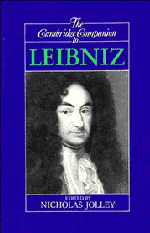Book contents
- Frontmatter
- 1 Introduction
- 2 G. W. Leibniz, life and works
- 3 The seventeenth-century intellectual background
- 4 Metaphysics: The early period to the Discourse on Metaphysics
- 5 Metaphysics: The late period
- 6 The theory of knowledge
- 7 Philosophy and logic
- 8 Philosophy and language in Leibniz
- 9 Leibniz
- 10 Leibniz's ontological and cosmological arguments
- 11 Perfection and happiness in the best possible world
- 12 Leibniz's moral philosophy
- 13 The reception of Leibniz in the eighteenth century
- Bibliography
- Index
8 - Philosophy and language in Leibniz
Published online by Cambridge University Press: 28 May 2006
- Frontmatter
- 1 Introduction
- 2 G. W. Leibniz, life and works
- 3 The seventeenth-century intellectual background
- 4 Metaphysics: The early period to the Discourse on Metaphysics
- 5 Metaphysics: The late period
- 6 The theory of knowledge
- 7 Philosophy and logic
- 8 Philosophy and language in Leibniz
- 9 Leibniz
- 10 Leibniz's ontological and cosmological arguments
- 11 Perfection and happiness in the best possible world
- 12 Leibniz's moral philosophy
- 13 The reception of Leibniz in the eighteenth century
- Bibliography
- Index
Summary
Leibniz's views on language, and on the relationship of language to philosophy, constitute a rich and, until recently, little explored area of his thought. Unlike some of his seventeenth-century contemporaries, Leibniz was conscious of a deep connection between the human capacity for language and the capacity to comprehend reality. Language is less a barrier between the mind and the world that must so far as possible be overcome than a lens that necessarily intervenes between mind and world and that can, depending on the skill of the optician, either distort or magnify our apprehension of the world. Accordingly, a careful study of language forms an essential part of the method of philosophy.
It is helpful at the outset to distinguish two primary focal points of Leibniz's interest in language. Within his writings these are represented, on the one hand, by the many sketches and plans associated with the notion of an ideal, artificial language - the “universal characteristic”; and, on the other, by numerous historical and philological investigations of natural languages, many of them directed towards uncovering the common roots of a multitude of human languages. On the face of it, there seems to be a tension between the aims and assumptions of these two very different approaches to the subject of language.
- Type
- Chapter
- Information
- The Cambridge Companion to Leibniz , pp. 224 - 269Publisher: Cambridge University PressPrint publication year: 1994
- 8
- Cited by



